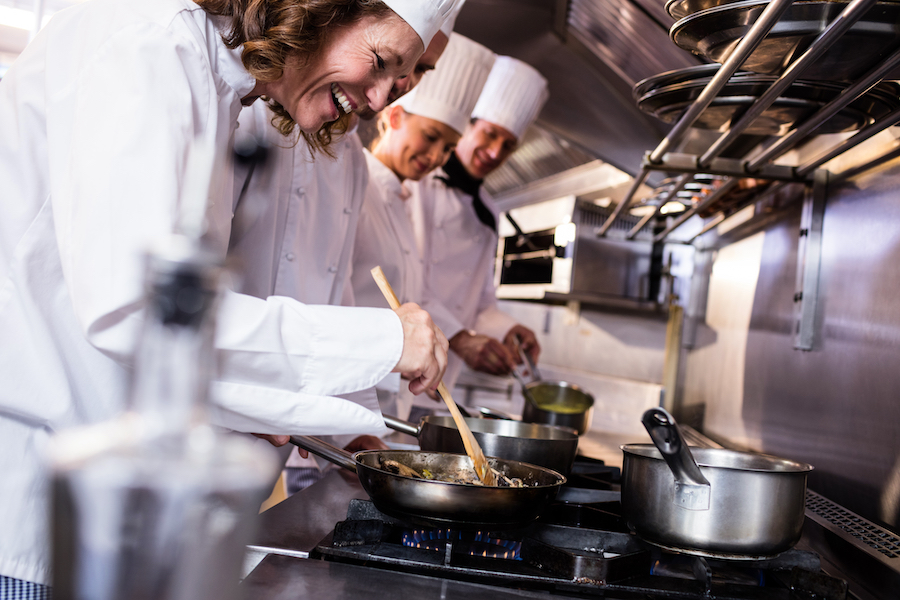- 1.Good organization is crucial
- 2.Clean as you go
- 3.Handle, clean, and store sharp objects properly
- 4.Keep close inventory and optimize storage
- 5.Wear the right equipment for the job
- 6.Communicate and collaborate with the rest of the staff
- 7.Follow all personal hygiene rules
- 8.Announce your presence to avoid running into others
- 9.Always prioritize quality over speed
- 10.Follow the chain of command to avoid conflicts and misunderstandings
Are you looking for fast and easy ways to improve efficiency in your commercial kitchen? Look no further than these restaurant kitchen rules and regulations for staff members. We discuss everything from organization to cleaning, personal hygiene, and the chain of command.
10 Restaurant Kitchen Rules and Regulations for Staff Members
1. Good organization is crucial
A disorganized restaurant kitchen can quickly dissolve into pure chaos where no one can find what they’re looking for, employees are fighting over counter space, or cannot use an appliance because someone else is already using it.
Every aspect of the kitchen, from the layout to the storage spaces has to be considered when you deal with day-to-day kitchen operations and try to make your employees’ jobs easier.
Make sure employees know where everything goes, and which area is used for what task. For example, knowing the separate food prep areas for meats vs vegetables can help you prevent cross-contamination.
Put knife racks next to cutting boards and keep utensils like ladles and spatulas close to the stoves for easy access. Set up the workstations so that you only need one step to reach everything you need.
Simple organization tips like these can help you save plenty of time in the long run, increasing the efficiency of your kitchen.
2. Clean as you go
One of the cardinal staff kitchen rules is never to wait until the end of the day to clean up. Clean as you go to avoid getting overwhelmed during busy times when you have to fulfill a lot of orders and your workplace is already a mess.
For instance, while waiting for the pasta to boil, you can wipe down the counter or tidy up the condiments you used. That way, you can move on to the next task without having to waste precious time cleaning and disinfecting surfaces.
This can also help you serve more customers faster, so everybody wins. In an efficient kitchen environment, everybody knows the rules and regulations for kitchen staff including cleaning as you cook.
3. Handle, clean, and store sharp objects properly
When it comes to rules for working in a restaurant kitchen, few are as important as proper handling of sharp objects like knives or meat cleavers. Improper use can lead to serious workplace accidents and endanger the safety of your staff.
You might also like: How to Manage a Restaurant Kitchen: Essential Tips for Success
Train your staff in appropriate blade handling, keep knives sharp so they can be used easily, and have different types of knives available for different tasks to avoid improper use. Plus, ensure all knives and cleaned and disinfected properly and carefully to avoid accidents and cross-contamination.
Storing sharp objects in a safe place is also important. Consider getting a magnetic knife rack that you place next to the cutting boards for easy access.
4. Keep close inventory and optimize storage
Each restaurant employee who comes into contact with the ingredients used for cooking should be aware of what they are, what they’re used for, how they should be stored, and how long they’re going to be fresh for.
Employ effective inventory strategies such as the FIFO (first-in-first-out) method where you use older ingredients first to reduce food waste.
Storage temperatures are also crucial for maintaining the integrity of your ingredients. Don’t jeopardize your customers’ safety by improperly storing food that should be kept in the fridge on a rack.
Having designated storage areas for different ingredients, and labeling everything with their best-by date can help you find things easier and know when you have to throw away something and place a new produce order.
5. Wear the right equipment for the job
Many restaurant kitchen rules are related to safely handling food. In that vein, always wear the right equipment for the job you’re doing at the moment, whether that is gloves, an apron, or even a mask.
That doesn’t just protect the food from contamination but it also protects you from potential danger or spilling something on your work clothes.
6. Communicate and collaborate with the rest of the staff
While not as unforgivable as other restaurant kitchen rules and regulations for staff, most kitchen managers will expect their employees to communicate and work together to make the team more efficient.
Teamwork is highly important in the restaurant industry because it’s a high-stress environment where people can crack under the pressure if they don’t have a support system in place.
So, if a new employee asks you a question, do your best to help them. Or if you see someone struggling, take the time to provide them with guidance if you can.
You might also be interested in: How To Hire A Chef For Your Restaurant: 5 Tips & Tricks
7. Follow all personal hygiene rules
Personal hygiene is one of those restaurant kitchen regulations that you can’t circumvent. Otherwise, you risk both your job and the customer’s safety.
As a restaurant kitchen employee, you need to:
- Wear a clean, well-fitting uniform and hat;
- Wear gloves when prepping food or cooking;
- Tie your hair back;
- Keep nails clean and short;
- Not wear excessive hand jewelry;
- Not cough, sneeze, or blow your nose next to the food;
- Not use your fingers to taste the food;
- Use perfume or cologne minimally;
Read more: How to Ensure Restaurant Food Safety & Why It Matters
You can use a knowledge base software to host all the rules and regulations you have for your staff for easy access and updating.
8. Announce your presence to avoid running into others
Given the chaotic nature of a restaurant job, one of the kitchen rules and regulations for staff is to announce their presence around other staff members to avoid collisions.
For example, let’s say you are carrying something that’s hot, wet, sharp, or fragile, and you have to walk past another employee who’s busy and not paying attention to you.
You should say “heads up,” “behind you,” or “incoming” when approaching them so they don’t turn at the last minute and send you both sprawling.
9. Always prioritize quality over speed
Speed of service is extremely sought after by restaurant customers, that’s true. But while you can find other ways to serve people quicker, this should never involve sacrificing food quality.
In the kitchen, you can move faster by organizing your space, ingredients, and appliances, making lists to help you cook faster, learning to multi-task or delegate tasks, and so on.
Do not skip steps in food prep or try to cut corners that will lead to a decline in food quality. Customers will know and they won’t hesitate to leave you a negative review online.
10. Follow the chain of command to avoid conflicts and misunderstandings
The term “kitchen chain of command” may sound antiquated, and while it has been around for hundreds of years, it’s still useful in modern kitchens today.
Everyone in the kitchen should be aware of who the others are, what their role and responsibilities are, and who they need to go to in case they have a question, or they don’t know how to do something.
Final Thoughts
A restaurant kitchen is often a busy and chaotic environment where everybody has to work together and abide by certain restaurant kitchen rules and regulations for staff members. With these rules in place, you will increase efficiency and boost both employee and customer satisfaction.





